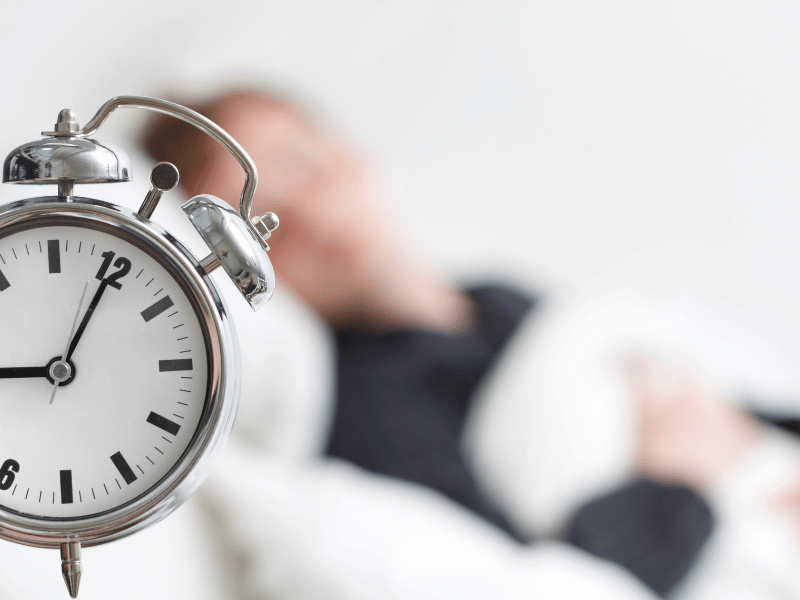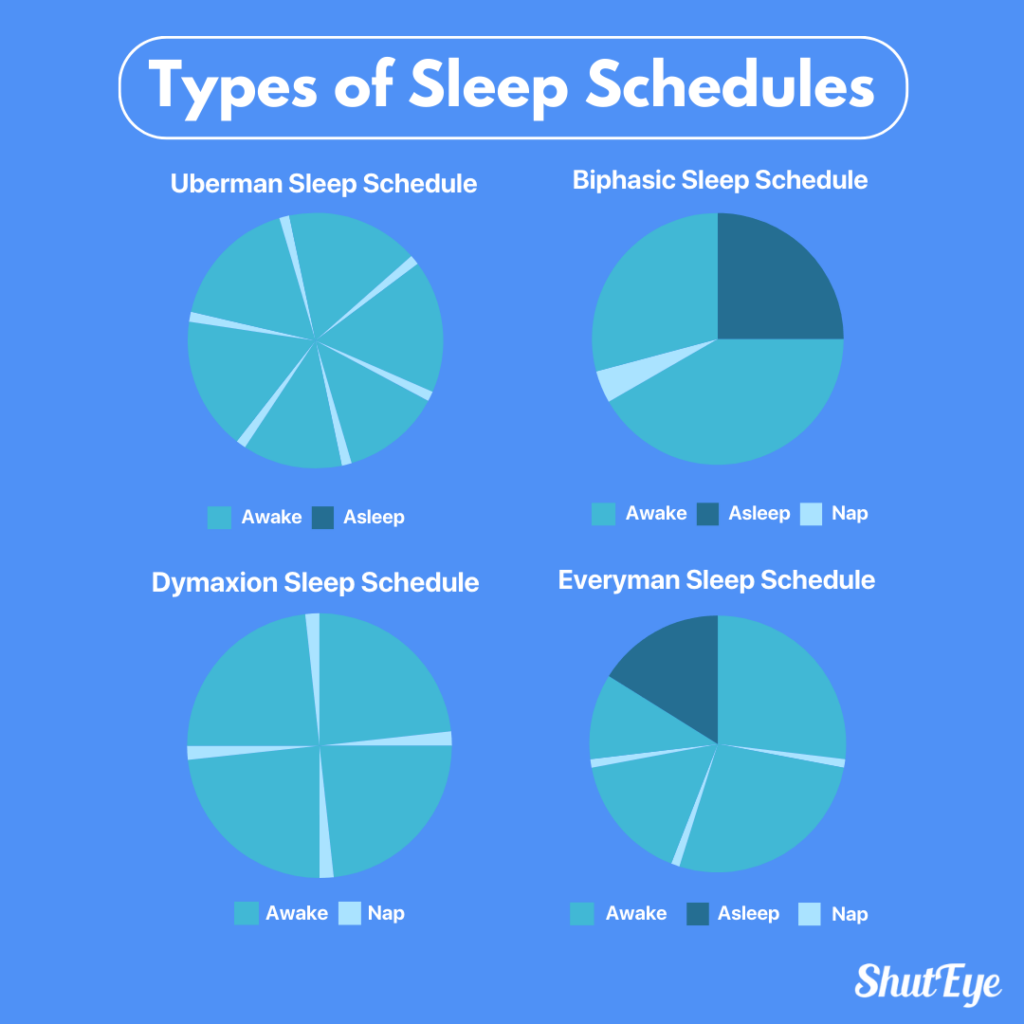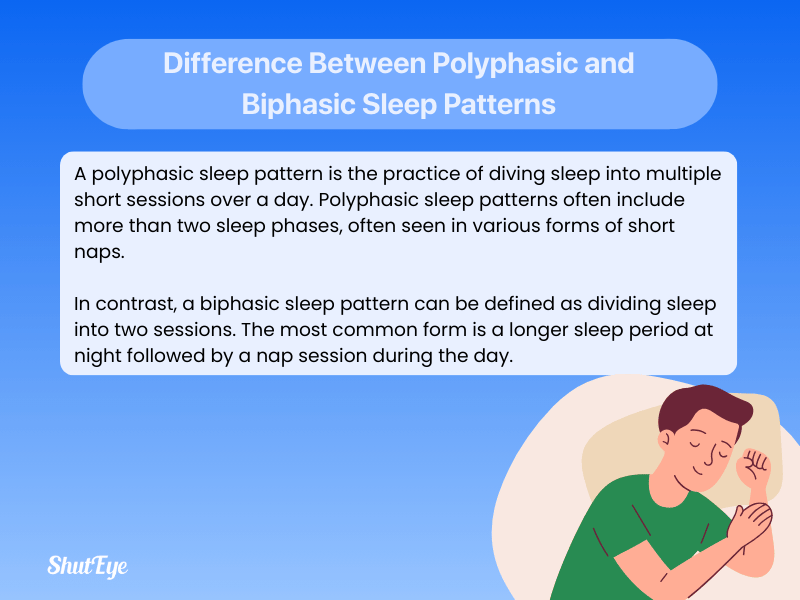


It’s common for many of us to sleep in one long period at night. However, some may find it difficult to do so, preferring to sleep shorter amounts throughout the day. Uberman sleep cycle is one of the polyphasic sleep patterns whereby a sleeper only sleeps for 2 hours per day in the form of six, 20-minute naps. While unconventional, some believe that it may enhance productivity and mental clarity.
But is this true? Let’s explore what the Uberman sleep cycle is, common myths, and the downsides of following it.

Sleep is made up of several sleep stages, mainly light sleep, deep sleep, and rapid eye movement (REM) sleep. While most people follow a monophasic or biphasic sleep pattern, the Uberman sleep cycle takes a different approach, reducing total sleep time to just 2 hours per day, divided into six evenly spaced 20-minute naps. This means you’ll be sleeping for a total of two hours, which is significantly less than the recommended seven to nine hours of sleep per day.
While some polyphasic sleepers claim that the Uberman sleep cycle increases productivity and alertness, there’s a lack of scientific evidence to support these claims. Moreover, adopting such a segmented sleep pattern can lead to sleep deprivation, which can have negative effects on your overall health, including impaired cognitive function and increased risk of accidents.

The difference in the Uberman sleep schedule from other sleep schedules lies in the sleep duration and how it is being spaced throughout the day.
Here’s a table that breaks down the various sleep schedules and their definition [1]:
| Sleep Schedule | Definition |
| Uberman Sleep Schedule | In this sleep schedule, sleepers take six, 20-minute naps that are evenly spaced throughout the day. |
| Dymaxion Sleep Schedule | For the dymaxion sleep schedule, sleepers take a 30-minute nap every 6 hours for up to 2 hours a day. |
| Everyman Sleep Schedule | The Everyman sleep schedule consists of a core sleep period that is supplemented by two, 20-minute naps, for up to 5 hours a day. |
| Biphasic Sleep Schedule | The biphasic sleep schedule is a pattern where the sleeper sleeps in two segments, one being a long sleep period at night and a short daytime nap. |

Polyphasic and biphasic sleep patterns represent two different approaches to sleep distribution throughout 24 hours. A polyphasic sleep pattern is the practice of dividing sleep into multiple short sessions over a day. Polyphasic sleep patterns often include more than two sleep phases, often seen in various forms of short naps [2].
In contrast, a biphasic sleep pattern can be defined as diving sleep into two sessions. The most common form is a longer sleep period at night followed by a nap session during the day [3]. This pattern is more aligned with traditional siestas in some cultures.
While biphasic sleep is somewhat closer to the conventional monophasic pattern (one long nighttime sleep period), polyphasic sleep drastically differs, aiming to reduce overall sleep time and increase wakefulness.
Before deciding on a biphasic or polyphasic sleep pattern, you are strongly recommended to approach them with caution and seek proper advice from a healthcare professional as it can significantly impact your physical and mental health.
Now let’s debunk some myths about the Uberman sleep cycle and its effectiveness.
There are several misconceptions surrounding the Uberman sleep cycle that need to be clarified. One common myth is that the Uberman sleep cycle allows you to function perfectly on just two hours of sleep per day. However, this isn’t supported by scientific evidence.
Another myth is that mastering the Uberman sleep cycle is easy and achievable for anyone. In reality, adapting to such a demanding sleep schedule can be extremely challenging and may not be suitable for everyone.
It’s important to understand that the Uberman sleep cycle isn’t a magical solution for maximizing productivity or achieving optimal cognitive function. It’s just one of the many polyphasic sleep schedules, and its effectiveness varies from person to person.
The Uberman sleep pattern may be beneficial for those who have irregular work schedules or those who don’t require much sleep genetically. However, there is currently no scientific evidence to support the benefits of polyphasic sleep.
The perception of increased productivity may be due to having more time available, rather than increased energy. Additionally, adopting a polyphasic sleep schedule can lead to chronic sleep deprivation and disrupt the natural sleep-wake cycle.
Before considering the Uberman sleep cycle or any polyphasic sleep schedule, it’s recommended to consult with a healthcare professional and consider individual sleep needs.
As much as possible, the Uberman sleep cycle or polyphasic sleep schedules should be avoided by all individuals. According to studies, polyphasic sleep schedules have repeatedly been shown to increase sleep fragmentation, REM sleep deficiency, circadian disruption, poorer cognitive performance, increased sleepiness, and sleep inertia [2].
While the Uberman sleep cycle may sound appealing to those seeking more waking hours, the reality is that it lacks scientific backing and poses significant risks to overall health. Sleep is essential for cognitive function and reducing it may lead to chronic fatigue and long-term health consequences.
If you’re looking to optimize your sleep and wake up refreshed, try out the ShutEye® app. With advanced sleep tracking and science-backed tools, you can build healthier habits without compromising your health. Download now!
Al-Abri, M. A., Zadjali, F., and Ganguly, S. (2020) Sleep Patterns and Quality in Omani Adults. Nature and Science of Sleep, 12, 231 [online]. Available at: https://doi.org/10.2147/NSS.S233912
Breus, M. (2024) Polyphasic Sleep: Pros and Cons of Breaking Sleep up Throughout the Day [online]. Available at: https://sleepdoctor.com/how-sleep-works/polyphasic-sleep
Weaver, M. D., Sletten, T. L., Foster, R. G., Gozal, D., Klerman, E. B., Rajaratnam, S. M., Roenneberg, T., Takahashi, J. S., Turek, F. W., Vitiello, M. V., Young, M. W., and Czeisler, C. A. (2021) Adverse impact of polyphasic sleep patterns in humans: Report of the National Sleep Foundation sleep timing and variability consensus panel. Sleep Health, 7(3), 293-302 [online]. Available at: https://doi.org/10.1016/j.sleh.2021.02.009